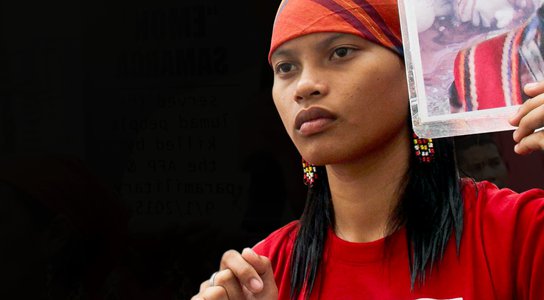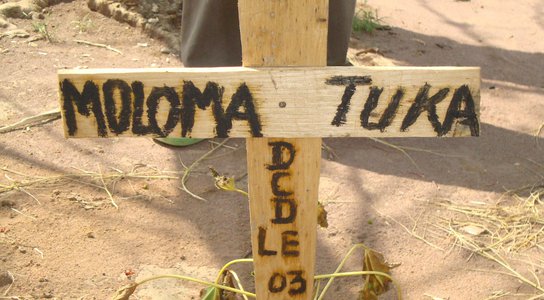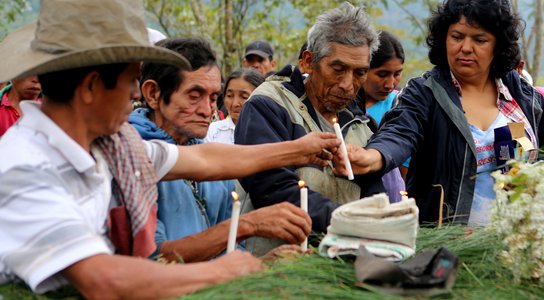Para la versión española, clique aquí.
More than three people were killed a week in 2015 defending their land, forests and rivers against destructive industries. For our new report On Dangerous Ground we documented 185 killings across 16 countries – by far the highest annual death toll on record and more than double the number of journalists killed in the same period.
The family of Michelle Campos (main picture) were among those killed. In September 2015, her father and grandfather were executed in full view of their family and friends in an attack that drove 3,000 indigenous people from their homes. Rich in coal, nickel and gold, their region of Mindanao in the Philippines is one of the most dangerous in the world for land and environmental activists, with 25 deaths in 2015 alone.
We get threatened, vilified and killed for standing up to the mining companies on our land and the paramilitaries that protect them... My father, grandfather and school teacher were just three of countless victims. We know the murderers – they are still walking free in our community. We are dying and our government does nothing to help us. - Michelle Campos
Global Witness are calling for urgent, meaningful action to end the rising tide of violence which – despite the high profile murder of Berta Caceres earlier this year – is largely escaping international attention.
Download the full version of our report, On Dangerous Ground (pdf)
These numbers are shocking, and evidence that the environment is emerging as a new battleground for human rights. Across the world industry is pushing ever deeper into new territory, driven by consumer demand for products like timber, minerals and palm oil. Increasingly communities that take a stand are finding themselves in the firing line of companies’ private security, state forces and a thriving market for contract killers.
The worst hit countries in 2015 were Brazil (50 killings), the Philippines (33) and Colombia (26). Conflicts over mining were the number one cause of killings in 2015, with agribusiness, hydroelectric dams and logging also key drivers of violence. In 2015, almost 40% of victims were from indigenous groups.
It’s likely that the true death toll is far higher. Many of the murders we know about occurred in remote villages or deep within rainforests – for every killing we are able to document, others cannot be verified, or go unreported.
Unprecedented violence in Brazil’s Amazon
Isídio Antonio was one of the latest victims in Brazil's Amazon, which saw unprecedented levels of violence in 2015 with 50 killings. Isídio had suffered years of assassination attempts and death threats for defending his land against a small group of powerful landowners who attempted to seize it for valuable timber, or to make way for ranches and plantations.
His appeals to the authorities for protection were consistently ignored, and police have never investigated his murder. Locals say he is the fourth victim in his small community in Maranhão state.
Globally, collusion between state and corporate interests shield many of those responsible for the killings. In cases that are well documented we found 16 were related to paramilitary groups, 13 to the army, 11 to the police and 11 to private security – strongly implying state or company links to the killings. There was little evidence that the authorities either fully investigated the crimes, or took actions to bring the perpetrators to account.
While impunity prevails, the criminalisation of protest is on the rise. Most notably in Africa, governments and powerful business interests are using their influence to marginalise land and environmental activists and turn public opinion against them, branding their actions as ‘anti-development’.
Urgent intervention needed
This is a rapidly growing crisis that is showing no signs of abating. Our warming climate and growing population mean that pressures on land and natural resources are set to increase, which means that without urgent intervention the numbers of deaths we’re seeing now will be dwarfed by those in the future.
Global Witness is calling on governments in affected countries to urgently intervene to:
- Increase protection for land and environmental activists at risk of violence, intimidation or threats
- Investigate crimes, including their corporate and political masterminds as well as the triggermen, and bring perpetrators to justice
- Support activists’ right to say no to projects on their land, and ensure that companies are proactively seeking their consent
- Resolve the underlying causes of violence against defenders, by formally recognising communities’ rights to their land, and tackling the corruption and illegalities that blight natural resource sectors



